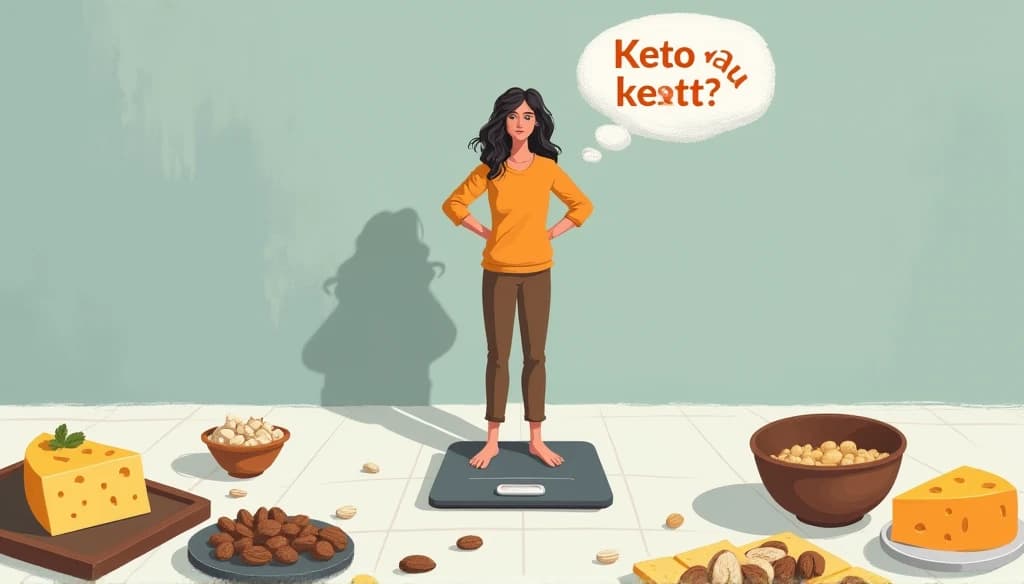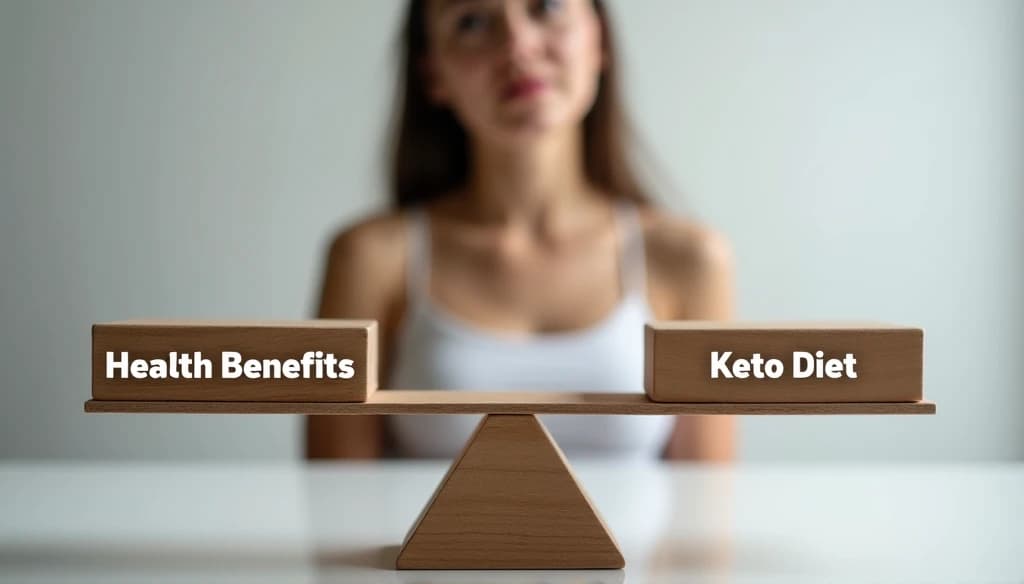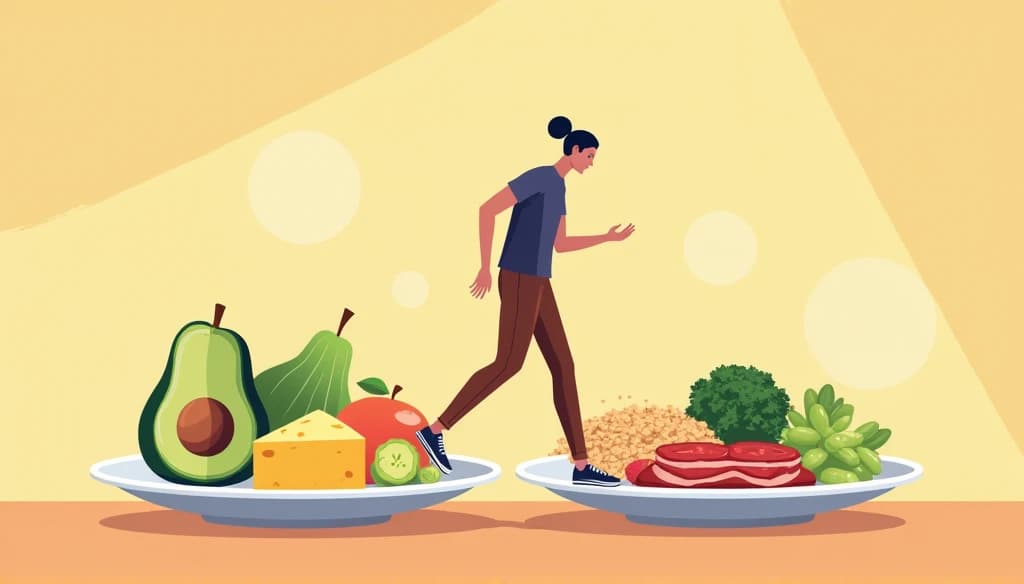Table of Contents
ToggleHave you been following the keto diet but feel like something isn’t quite right? Maybe you’re tired, frustrated with slow progress, or even gaining weight. If you’re asking yourself, “Is keto really the best diet for me?”—you’re not alone. Many people start keto with high hopes, only to find it doesn’t work for them long-term. In fact, some who quit keto report better results, including weight loss, improved energy, and better overall health.
So, how do you know when it’s time to quit keto? This article breaks down the key signs to look for, provides evidence-based alternatives, and even shares why some people say, “I quit keto and lost weight!”
What Is the Keto Diet and Why Isn’t It for Everyone?

The ketogenic (keto) diet is a high-fat, low-carb diet designed to shift your body into a state of ketosis, where it burns fat for fuel instead of carbs. This process can lead to rapid weight loss, improved mental clarity, and stabilized blood sugar for some people.
However, keto isn’t a one-size-fits-all solution. While it works wonders for certain individuals, others may experience side effects, plateaued weight loss, or even worsening health.
Let’s explore the top signs that you should consider quitting keto—and why it may not be the miracle solution it’s often marketed as.
Signs You Should Quit Keto
1. You’re Gaining Weight Instead of Losing It

One of the biggest red flags on keto is unexpected weight gain. While the initial phase of the diet often leads to rapid water weight loss, long-term results can vary. If you’re gaining weight despite sticking to keto macros, it could mean:
- You’re overeating high-calorie fats like cheese, butter, and nuts.
- Your body isn’t in ketosis due to hidden carbs or too much protein.
- Keto isn’t addressing underlying metabolic or hormonal issues.
Case in point: Many people who quit keto and adopt a balanced, calorie-aware diet find they lose weight more sustainably.
2. You’re Constantly Tired and Low on Energy

Fatigue is common during the first weeks of keto as your body adapts, but if you’re still dragging months later, it’s a problem. Possible reasons include:
- Electrolyte imbalances: Keto can deplete sodium, potassium, and magnesium.
- Inadequate carbs: Some people need more carbs to fuel workouts and brain function.
- Thyroid problems: The restrictive nature of keto may disrupt thyroid hormones.
If you’re feeling worse instead of better, it might be time to reintroduce healthy carbs for energy.
3. You’re Experiencing Digestive Issues
Keto can wreak havoc on your digestive system, especially if your diet lacks fiber-rich foods like whole grains, fruits, and legumes. Signs of trouble include:
- Chronic constipation from low fiber intake.
- Stomach pain or bloating due to excessive fat consumption.
- Diarrhea caused by too much dairy or MCT oil.
Switching to a more balanced diet with diverse foods often resolves these issues quickly.
4. You’re Craving Carbs Nonstop

Are you constantly fantasizing about bread or pasta? Chronic carb cravings might mean your body isn’t adapting well to keto. This could be due to:
- Nutrient deficiencies: Low-carb diets may limit essential vitamins and minerals.
- Psychological stress: Restrictive diets can create a “forbidden food” mentality.
Many people who quit keto report that allowing moderate carbs helps curb cravings and fosters a healthier relationship with food.
5. You’re Struggling to Stay Social
Keto’s strict rules can make dining out or attending events challenging, leading to feelings of isolation. Social stress can make it difficult to stick to the diet long-term and affect your overall happiness.
If keto is interfering with your social life, it might be time to pivot to a more flexible eating plan.
6. You’re Not Seeing Health Improvements

Keto is often promoted for its health benefits, such as better blood sugar control and reduced inflammation. However, it doesn’t work for everyone. You should consider quitting keto if you notice:
- Worsening cholesterol levels (e.g., elevated LDL).
- High blood sugar or insulin resistance despite carb restriction.
- No improvement in energy, mood, or other health markers.
7. You’re Stuck in a Plateau
Hitting a weight loss plateau is frustrating, especially when you’re following keto to the letter. Common reasons include:
- Overeating calories from fat.
- Decreased metabolism due to prolonged calorie restriction.
- Hormonal changes that affect weight loss.
Quitting keto and adopting a more balanced approach often helps break through plateaus.
Why Quitting Keto Can Help You Lose Weight
It may sound counterintuitive, but quitting keto can actually lead to better weight loss for some people. Here’s why:
1. Easier Calorie Management
Keto’s high-fat nature makes it easy to overconsume calories. Transitioning to a moderate-carb diet with lean proteins and healthy fats can help you better control portions.
2. Improved Hormonal Balance

Low-carb diets can disrupt hormones like leptin, which regulates hunger, and thyroid hormones, which control metabolism. Reintroducing carbs often restores balance and aids weight loss.
3. More Sustainable Choices
For long-term success, sustainability is key. A flexible diet with room for all food groups is easier to stick to, reducing the chances of bingeing or quitting altogether.
Comparative Table: Keto vs. Balanced Diet
| Aspect | Keto Diet | Balanced Diet |
|---|---|---|
| Carb Intake | < 50g/day | 150-300g/day |
| Primary Fuel | Fat (ketones) | Carbs |
| Weight Loss | Rapid at first, may plateau | Gradual and sustainable |
| Energy Levels | May drop during adaptation | Stable with adequate carbs |
| Digestive Health | Risk of constipation or diarrhea | Improved with fiber-rich foods |
| Social Flexibility | Limited (strict rules) | High (flexible and inclusive) |
| Sustainability | Hard to maintain long-term | Easy to follow indefinitely |
What Happens After You Quit Keto?

If you transition off keto properly, you can maintain or even improve your weight and health. Here’s what to expect:
- Weight Stabilization: Water weight might return, but fat loss can continue.
- Improved Performance: Carbs fuel workouts and enhance endurance.
- Better Mood: Carbs boost serotonin, improving mental health.
Final Thoughts: Is It Time to Quit Keto?
The keto diet can work for some, but it’s not the ultimate solution for everyone. If you’re experiencing weight gain, low energy, or other issues, it may be time to reassess. Remember, quitting keto doesn’t mean giving up on your health goals. In fact, many people say, “I quit keto and lost weight,” proving that a balanced, flexible approach often leads to better results.
Trust your body, listen to what it needs, and choose a diet that supports both your physical and mental well-being.
FAQs About Quitting Keto
Will I Gain Weight After Quitting Keto?
Not necessarily. While you may regain water weight, fat gain is avoidable if you manage calories and eat balanced meals.
How Should I Transition Off Keto?
Gradually reintroduce carbs by adding fruits, whole grains, and starchy vegetables to your meals while monitoring portion sizes.
Why Do People Say, “I Quit Keto and Lost Weight”?
Some people find that a less restrictive diet helps them control calories better, leading to sustainable weight loss.
Can Keto Cause Long-Term Health Problems?
For some, prolonged keto can lead to nutrient deficiencies, elevated cholesterol, or hormonal imbalances. Consult a doctor if you’re concerned.
Is Keto Better for Certain People?
Yes, keto may benefit those with epilepsy, type 2 diabetes, or insulin resistance. However, it’s not ideal for everyone.





